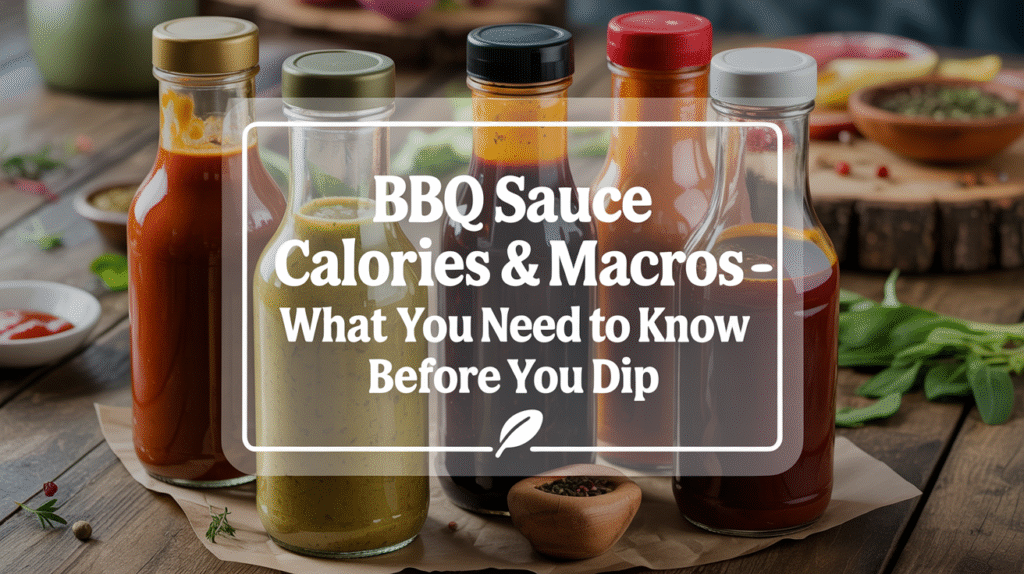Affiliate Disclosure: PantryBrands.co.uk is a participant in the Amazon.co.uk Associates Programme. As an Amazon Associate, we earn from qualifying purchases made through links on this site.
BBQ sauce is a flavour-packed condiment, but it’s also a hidden source of sugar and calories that often goes unnoticed. Whether you’re counting macros, trying to lose weight, or just aiming for a healthier diet, understanding the nutritional breakdown of BBQ sauce is essential. This guide provides a clear overview of BBQ sauce calories and macronutrients, helping you make informed decisions when reaching for that smoky bottle.

How Many Calories Are in BBQ Sauce?
On average, one tablespoon (15g) of BBQ sauce contains 25 to 70 calories, depending on the brand and ingredients. The calorie content is primarily determined by the amount of sugar and type of base used.
Calorie Ranges by Type
Different styles of BBQ sauce have different calorie profiles:
- Traditional BBQ sauce (thicker, sweeter): 45–70 calories per tablespoon
- Vinegar-based sauces: 20–35 calories per tablespoon
- Low-sugar or “light” sauces: 10–25 calories per tablespoon
Factors That Affect Calories
- Sweeteners used – Molasses and brown sugar increase calories
- Thickness – Thicker sauces tend to have more sugar and hence more calories
- Additives – Oils, butter, or fruit purée may boost the calorie count
Macronutrient Breakdown of BBQ Sauce
Most of the calories in BBQ sauce come from carbohydrates, especially sugars. Fats and proteins are usually negligible.
Typical Macronutrient Profile per Tablespoon
Here’s a breakdown of the most common macronutrient values:
- Carbohydrates: 6–17g (mostly sugars)
- Sugars: 5–12g
- Fat: 0–1g
- Protein: 0–1g
Low-Carb BBQ Sauce Options
If you’re following a keto or low-carb diet:
- Look for BBQ sauces with less than 3g of net carbs
- Choose options sweetened with erythritol, stevia, or monk fruit
Hidden Sugars in BBQ Sauce
The sweet taste of BBQ sauce often comes from added sugars, which can be quite high even in small servings.
Common Sweeteners Used
Be mindful of these high-sugar ingredients:
- Brown sugar and molasses – provide rich sweetness but add calories
- High-fructose corn syrup – common in commercial brands
- Honey or maple syrup – used in gourmet or homemade varieties
Healthier Sweetener Alternatives
Try sauces that use:
- Dates or fruit concentrates
- Coconut sugar or natural zero-calorie sweeteners
How BBQ Sauce Affects Your Diet Goals
Depending on how you use it, BBQ sauce can either complement or derail your nutrition plan.
Weight Management
- Portion control is key – even small amounts can add up quickly
- Use BBQ sauce as a glaze or mixed into dishes, not as a dip
Blood Sugar Management
- High-sugar sauces can spike blood sugar levels
- Opt for low-glycaemic sauces if managing diabetes
Choosing a BBQ Sauce That Fits Your Macros
Reading the label is the easiest way to avoid high-calorie or high-carb sauces.
What to Look for on the Label
Check for:
- Total calories per tablespoon
- Carbs and sugars per serving
- Fat content and types of sweeteners used
Best Uses for Different Macro Goals
- Low-calorie goals: Use vinegar-based or light sauces
- High-protein diets: Pair with grilled lean meats like chicken or turkey
- Low-carb goals: Choose sugar-free or keto BBQ sauces
Tips for Making a Lower-Calorie BBQ Sauce at Home
Homemade BBQ sauce can be a healthier alternative to store-bought varieties.
Ingredients for a Lighter BBQ Sauce
Use these to reduce calorie content:
- Tomato purée or passata as a base
- Apple cider vinegar for tang
- Spices like smoked paprika and mustard powder
- Natural sweeteners such as stevia or date syrup
Portion and Storage Tips
- Use a teaspoon, not a ladle, when adding sauce
- Store in glass jars in the fridge for freshness
- Label your homemade sauce with the estimated calories per tablespoon
FAQs About BBQ Sauce Calories & Macros
Here are some questions and answers about BBQ sauce nutrition and how it fits into different diet plans.
How many calories are in a typical BBQ sauce?
Most store-bought BBQ sauces have between 25 and 70 calories per tablespoon, depending on sugar content and thickness.
Is BBQ sauce high in carbs?
Yes, especially in the form of sugar. Expect between 6 and 17g of carbs per tablespoon, with most being sugar.
Can I have BBQ sauce on a keto diet?
Yes, but only if you choose a low-carb or sugar-free version. Look for sauces with less than 3g of net carbs per serving.
Does BBQ sauce contain any fat or protein?
No significant amount. Most BBQ sauces have less than 1g of fat or protein, making them primarily carbohydrate-based.
What’s the healthiest way to use BBQ sauce?
Use sparingly. Try brushing it on grilled vegetables or lean meat instead of using it as a dipping sauce to control portions and calorie intake.
